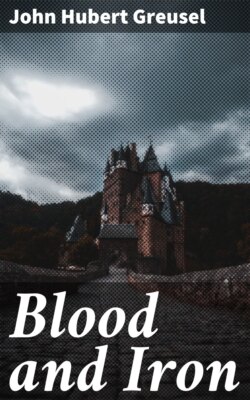Читать книгу Blood and Iron - John Hubert Greusel - Страница 16
На сайте Литреса книга снята с продажи.
8
ОглавлениеIdyl of the child Otto, in his huge Gothic cradle at Schoenhausen; wonders that gather ’round his destiny, a forecast and a reality.
¶ Otto Edward Leopold von Bismarck, the great central figure in our story, was the fourth of six children, three dying in infancy. He was born April 1, 1815, but a few months before the crowning defeat at Waterloo—that year big with the hammer-blows of Destiny!
¶ In lonesome Schoenhausen on the Elbe, the village lately devastated by Marshal Soult and his plundering soldiers, the infant Otto sleeps peacefully in his oak-carved Gothic cradle. A century later, we still see that huge cradle as one of the souvenirs in the famous Bismarck museum at Schoenhausen.
¶ Schoenhausen house is one of those thick-walled monuments of mediæval masonry.
There is, to be sure, something out of drawing about the antiquated three-story house; and we survey with respect for the past the queer courtyard, leaded panes, park with the artificial island, wooded byways, and old forest, and not far away is the village church with the square stone tower; hard by, also, the kattenwinkel, or Katte’s corner, at the confluence of the Havel and the Elbe; and on the house is the Katte’s coat-of-arms, a cat watching a mouse, the mark of the sturdy 17th century builder, Katte, who to honor his wife, Dorothea Sophia Katte, added her name to his builder’s sign over the lintel.
¶ In this historical 1815, seed-time and harvest strangely blend, yet are years apart.
For, while the child sleeps in his Gothic cradle, the Congress of Vienna meets to redistribute among the hungry kings the old domains stolen as prizes in the long Napoleonic wars; and in turn, after incredible political adventures, running over years, the child before us, grown to be a man, will smash the rulings of Vienna and will build an empire stronger far than that of imperial France, now dying at Waterloo.
¶ All these wonders gather ’round the destiny of the child in the big Gothic cradle, before which we now tiptoe at Schoenhausen, lest we awaken the baby and he cry.
¶ When the French overrun Prussian territory the old land-owning military aristocracy was reduced to bankruptcy. Mortgages falling due could not be paid; the king extended credit for four years; and in the interim Prussians were forced to use depreciated rag-money; all the gold and silver had been confiscated by the French invaders.
¶ Great dissatisfaction followed. The farms had been tilled by feudal-laborers, practically slaves; these oppressed peasants now flew to arms.
Schoenhausen was a dreary place indeed; while the Bismarcks were better off than their neighbors, still the times were out of joint and ruin fell over the broad acres.
¶ Then came an unexpected change. Along about 1816, Karl inherited Kneiphof, Kuelz and Jarchelin estates from his cousin, moved to Kneiphof, just east of the hamlet of Naugard.
The house was exceeding modest; a brook, the Zampel, ran near by; and there was a carp pond. Karl was fond of hunting in the old beech forest. Such were the unsettled conditions in the Bismarck family, up to Otto’s sixth year.
